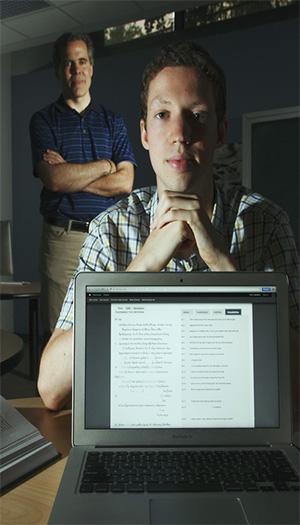Toolmaking for Texts

Virgil
Student researchers forge new tools for ancient texts

Asbury J. Clarke Professor of Classical Studies Christopher Francese and Nick Stender '15 pose behind a laptop displaying Stender's vocabulary lists for the "Aetia."
by Ben West '14
Lucy McInerney ’15 stands before a whiteboard crowded with names. Already long, the list overlays the blue smear of erased scholars and commentators on Virgil’s Aeneid. To her right, a table supports stacks of books. Behind them, McInerney’s research partner, Tyler Denton, a Ph.D. candidate heading to the University of Colorado-Boulder in the fall, has his head in his hands. They have reached an impasse.
McInerney and Denton comprise one of two teams working under the aegis of Christopher Francese, Asbury J. Clarke Professor of Classical Studies. Together with Nick Stender ’15, they are crafting digital, teachable versions of ancient texts.
“We’re going through and comparing and contrasting all of the commentaries,” says McInerney, a classical studies major. “We try picking what our favorite notes are and compiling our own digitized, ultra-perfect commentary.” Though the list currently embraces only the first 25 lines of book one of the 12 book epic, McInerney and Denton’s contribution to the research project will eventually cover the entire 2,000-year-old poem.
To develop their scholarly remix, which will be used in Advanced Placement and intermediate college Latin courses, McInerney and Denton have first gone old school. "We’ve been doing it out loud and yelling back and forth,” says McInerney, as the pair grapples with which notes will best help students at a lower level. “What we’re going to do from now on is each of us will take a book and review it, and the other will say, ‘no, this is redundant,’ or ‘you need more notes on that.’ " Both have experience in the classroom; McInerney has been a teaching assistant in Dickinson Latin courses in the past, and Denton is a Virgilian recommended to Francese.
The Aeneid project belongs to the digital humanities, an approach and field of inquiry across dozens of humanistic disciplines. Digital humanists expose historic letters or classical poetry to digital tools, making the poetry of Virgil or the prose of Latin scholars searchable, hyperlinked and integrated into a labyrinth of centuries-old scholarship. Such modifications enrich a text with images, audio and other media, assisting students who are just beginning to learn.
“If words I find are not in the Dickinson College Commentaries (DCC) core vocabulary list, then I create a dictionary entry for it,” explains Stender, a double major in classical studies and philosophy. Stender’s work with Francese encompasses several smaller projects: to open up the Aetia, Callimachus’ third-century B.C. account of strange customs and rituals, to the DCC’s vocabulary aids; to effect the changes made by Stanford scholar Susan Stephens on the Aetia; to prepare for a seminar this fall about Lucian’s second-century work, "Philosophies for Sale," which Francese will teach and for which Stender will later produce a commentary, a first in English.
“[Francese] has very ambitious visions for the [DCC] Web site. It’s really nice working with someone who has essentially created something from scratch,” says Stender, who describes his own work as “leaving my little footprint in [the] larger footprint” Francese makes on the field.
Echoing a sentiment common among faculty and student researchers across campus this summer, Francese values his working relationship with students. “Doing research in the summer is really about people, relationships and collaborations,” he says, “which is what makes it really enjoyable to me.”
McInerney and Denton, meanwhile, have moved past the difficulty of the first 25 lines. “It was really helpful in the beginning to learn what the other looks for,” says McInerney. Now on to book two.
Learn more
- Research at Dickinson
- "Beetle Juice"
- "Meta-classroom"
- Classical Studies
- Dickinson College Commentaries
- Latest News
Published August 11, 2014